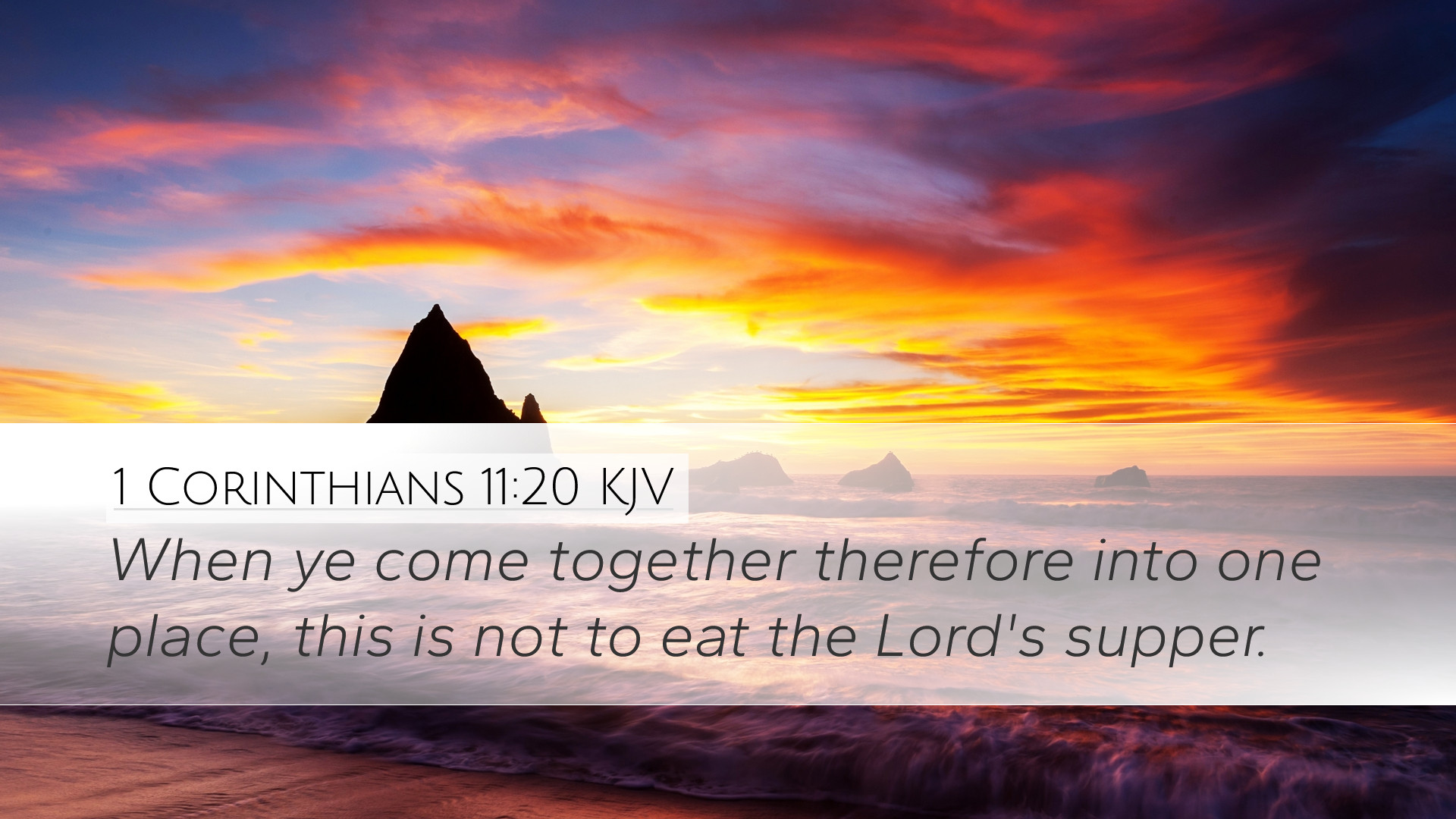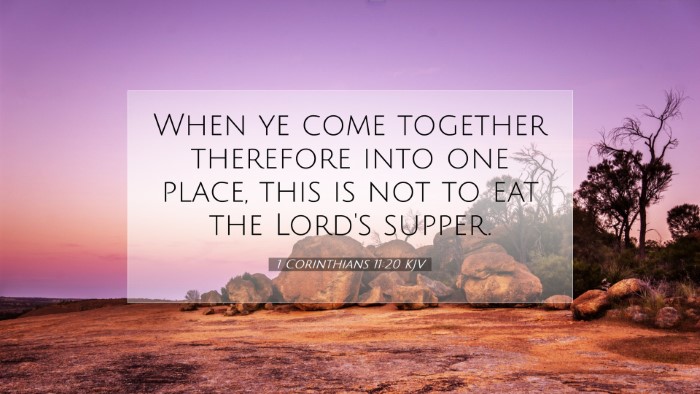Commentary on 1 Corinthians 11:20
Verse Text: "When you come together, therefore, into one place, this is not to eat the Lord's supper."
Introduction
The Apostle Paul, in his first letter to the Corinthians, addresses a series of issues troubling the church in Corinth. In 1 Corinthians 11:20, he critiques the manner in which the believers were observing the Lord's Supper, asserting that their gatherings were not aligning with the intended purpose of this sacred institution.
The Context of the Verse
This verse occurs within a broader discourse on unity and proper conduct during communal worship. The Corinthians had established factions and had lost sight of the communal and sacrificial nature of the Lord's Supper, which is meant to affirm the unity of believers.
Historical Background
The church in Corinth was facing numerous social and spiritual challenges. Many members were from diverse backgrounds, which led to varying interpretations and practices regarding worship.
Paul’s aim in this epistle, particularly in chapter 11, is to restore order and highlight the significance of the Lord’s Supper as a community-oriented celebration.
Insights from Matthew Henry
Matthew Henry notes that the phrase "when you come together" signifies an assembly meant for collective worship. He emphasizes that the Corinthians were more concerned with their personal interests rather than the community’s spiritual nourishment. Henry states:
"They had not come together for the Lord’s supper, but rather for their own feasting and gluttony."
He warns against losing the purpose of communal gatherings and stresses that the Lord’s Supper is fundamentally about Christ’s sacrifice and the unity it fosters among believers.
Insights from Albert Barnes
Albert Barnes presents a similar critique, interpreting Paul’s words as a reminder that the observance of the Lord's Supper should transcend mere ritualistic participation. He elaborates:
"This is not to eat the Lord's supper; it is a mere meal in which the distinctions of classes are maintained, and the spirit of reverence is absent."
Barnes stresses that the true purpose of the Supper is found in its spiritual significance, which encourages love, equality, and remembrance of Christ’s sacrifice.
Insights from Adam Clarke
Adam Clarke adds depth to the discussion by emphasizing the importance of intention during the observance of the Lord's Supper. He comments:
"The meaning of the Lord's supper is lost in selfish feasting; what should celebrate the memory of Christ, instead degenerates into a selfish act."
Clarke calls for believers to examine their motives and actions during communion, urging that a genuine, humble approach is essential for honoring the Lord’s institution appropriately.
Theological Implications
1 Corinthians 11:20 opens up several theological implications regarding the nature of worship, community, and the significance of the Lord’s Supper:
- Unity in Diversity: The gathering of believers in the Lord's Supper should reflect the overarching unity of the Body of Christ, despite individual differences.
- Remembrance of Christ: The Lord's Supper serves not only as a ritual but as a powerful act of remembrance of Jesus’ sacrifice, calling the congregation to focus on Him and His work.
- Communal Responsibility: Paul's exhortation reminds believers of their shared responsibility to lift each other up and to foster a spirit of love and support.
- Sacredness of the Meal: The Lord's Supper is rooted in sacredness and should be approached with reverence, in contrast to ordinary meals.
Practical Applications for Today
In light of Paul’s admonition in 1 Corinthians 11:20, modern congregations can draw several practical applications:
- Intentional Participation: Church leaders must educate congregants on the significance of the Lord’s Supper and encourage participation that reflects Christ-centered unity.
- Community Focus: Gatherings should prioritize community and collective worship, ensuring that all are treated with dignity and respect.
- Self-examination: Prior to partaking in the Lord’s Supper, individuals should engage in self-reflection, ensuring their hearts are aligned with the purpose of the communion.
- Encouraging Inclusivity: Churches should foster an environment where every member, regardless of status, feels welcomed and valued during communion services.
Conclusion
In conclusion, 1 Corinthians 11:20 serves as a vital reminder to believers of the sacredness and communal nature of the Lord’s Supper. Through insights from public domain commentators such as Matthew Henry, Albert Barnes, and Adam Clarke, we understand that the observance of this ordinance should transcend selfish interests and embody the love and remembrance of Christ. The challenge for today’s church is to uphold these principles and to ensure that every gathering is a reflection of Christ’s love and unity among believers.


